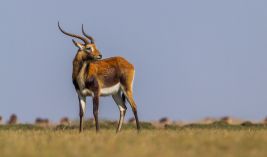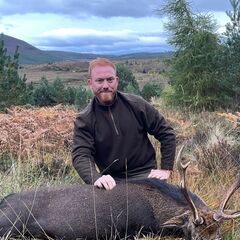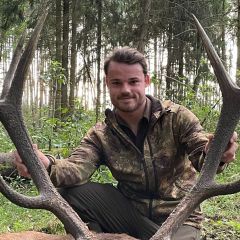Uganda
Uganda has so many exciting game species and offers 1st class hunting
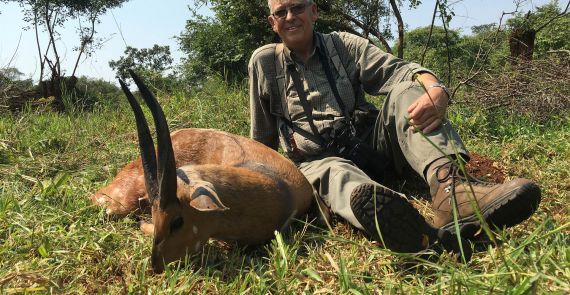
Highligts
- Discover gorillas, chimpanzees and exciting birdlife
- Genuine Safari Feeling
- Sought-after Game Species such as Sitatunga and Kob
- Huge Hunting Areas
Hunting in Uganda
The Republic of Uganda is a country in Eastern and Central Africa bordered in the east by Kenya, in the North by Sudan, by the Democratic Republic of Congo in the West, Rwanda in the Southwest and Tanzania in the South. The southern part of the country includes a substantial portion of Lake Victoria, within which it shares borders with Kenya and Tanzania. Uganda takes its name from the historical Buganda kingdom, which encompasses a portion of the south of the country, including the capital city of Kampala. The current president of Uganda, Yoweri Kaguta Museveni, is both head of state and head of government. The president appoints a prime minister who aids him in his tasks. The parliament is formed by the National Assembly, which consist of 303 members of whom 86 members are nominated by interest groups, including women and the Ugandan army. The remaining members are elected for five-year terms during general elections.
Uganda is divided into districts spread across four administrative divisions: Northern, Eastern, Central and Western. The districts are all named after their 'chief town'. Uganda has substantial natural resources, including fertile soils, regular rainfall and sizable mineral deposits of copper and cobalt, oil and gas. Agriculture is the most important sector of the economy, employing over 80% of the work force, with coffee accounting for the bulk of export revenues. Since 1986, the government - with the support of foreign countries and international agencies - has acted to rehabilitate an economy decimated during the regime of Idi Amin and civil war.
Geography and Climate
Uganda is located on the East African Plateau, averaging about 1,100 meters (3,600 feet) above sea level, which slopes steadily downwards to the Sudanese Plain to the north. Much of the south is poorly drained, while the center is dominated by Lake Kyoga and surrounding marshy areas. Uganda lies almost completely within the Nile basin. The Victoria Nile drains into Lake Kyoga, then into Lake Albert and north to Sudan. One small area on the eastern border of Uganda is drained by the Turkwel River, which is part of the internal drainage basin of Lake Turkana. Although generally equatorial, Uganda's climate is not uniform as the altitude modifies the climate, but temperatures rarely climb to the 90s F during the day or drop to the 40s F at night. Southern Uganda is wetter, with rain generally spreading throughout the year, but mainly occuring in March - June and November - December. Further to the north, a dry season gradually emerges so that January and February are much drier than the rest of the year.
Most of the important cities are located in the south near Lake Victoria, including the capital, Kampala, and the "airport city" of Entebbe. Although landlocked, Uganda contains many large lakes. In addition to Lake Victoria and Lake Kyoga, there are amongst others Lake Albert, Lake Edward, and the smaller Lake George.
Accommodation in Kampala and in the Field
Upon arrival at Entebbe Airport (Airport Code: EBB) and departure, depending on your flight schedule, you will be accommodated in a good three-star hotel in Kampala (www.cassialodge.com). Our staff picks you up at the airport and drops you off. Your lodging in the field will be either in traditional East African safari tents (Kyankwansi Block, Karamoja & Lake Mburo) or traditional grass thatched tented bungalows (Mayanja Lodge) serviced for by trained staff. Our field cooks provide three solid meals (breakfast, lunch, dinner) per day. The cooking in our restaurant samples different kitchens such as Indian, African, German, Italian and Chinese.
All our camps & lodges are semi-permanent structures equipped with 24/7 power supply and satellite internet. The internet can only be used for emails and Skype calls.
Hunting Season
Our hunting season is from January through November. It rains all year round (which is why the country is so lush) with slightly more rain on average in April-June and November. However, the rainfall varies from year-to-year. Some species move with the rain, but we hunt where the animals are. The best time to hunt Buffalo and Hartebeest is during the months of December to end of April. After that the grass is too high and hunting buffalo becomes challenging. All other species may be hunted year round.
Sitatunga Hunting
Our safaris for the elusive ghost of the swamp, the Sitatunga, are undertaken in the Kafu River Basin and in the papyrus belts along the banks of River Nile. Our areas hold the highest density of Sitatunga anywhere in Africa. Our areas hold the highest density of Sitatunga anywhere in Africa. It is not uncommon to see between 7 to 25 Sitatunga (males, females & young ones) daily in the course of your safari. Sitatunga hunting involves quite a bit of preparation. Before the start of a safari the papyrus has to be slashed at least three to four weeks ahead of time and a cerebeti (elevated platform) must be built in either a tree or on floating papyrus.
Video Gallery
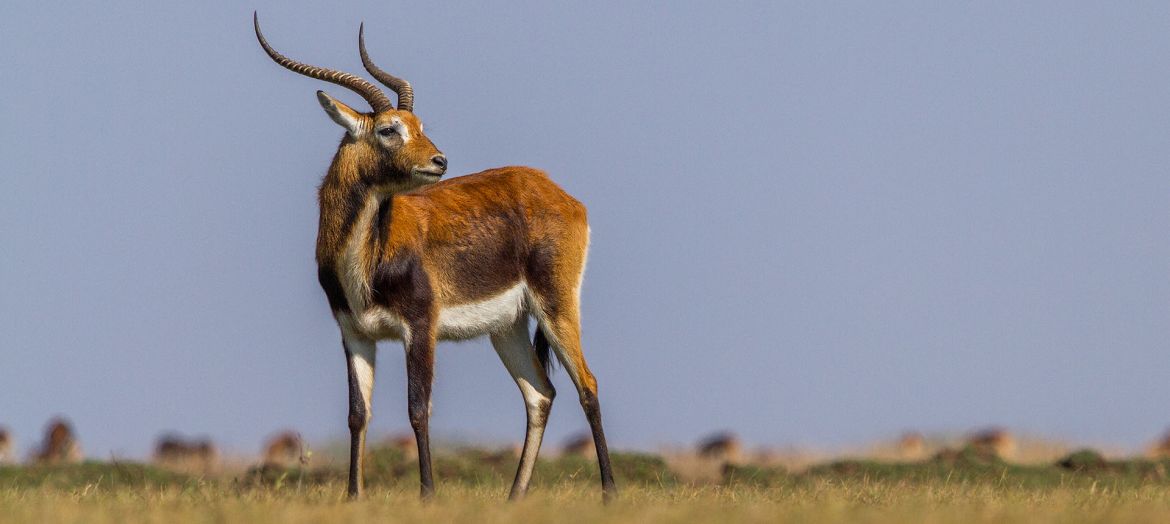
-
 Hunting in Africa
Hunting in Africa
Game
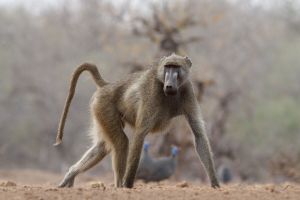
Baboon
Scientific Name: Papio sp. Sub-species: Five species are currently recognised (this is some disagreement on whether they are true separate species or sub-species. The true number of sub-species is also currently unknown) Hamadryas baboon (P. hamadryas) - Horn of AfricaGuinea baboon (P. papio) - Far western AfricaOlive baboon (P. anubis)- north central african savannahYellow baboon (P....
Read more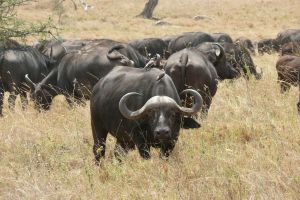
Buffalo, Cape
Videnskabeligt navn: Syncerus caffer Underarter: Dværgbøffel (Cyncerus c. nanus), Savannebøffel (Cyncerus c. S. c. brachyceros ), Nilbøffel (Syncerus caffer aequinoctialis). Cafferbøffel (Cyncerus caffer caffer Udbredelse: Nilbøflen er den af de fire arter der har det nordligste udbredelsesområde: Fra Senegal i vest i et bredt...
Read more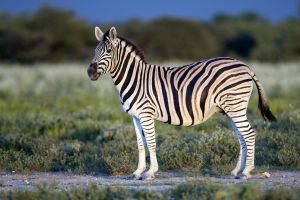
Burchell's Zebra
Videnskabeligt navn: Equus burchelli Underarter: Grant's Zebra (E.b. böhmi) Chapman's Zebra (E.b.antiquorum) Udbredelse: Burchell's Zebra: Botswana og Sydafrika. (den ægte burchell's zebra er uddød). Grant's Zebra: Mozambique, Tanzania, Kenya, Uganda og Ethiopien. Chapman's Zebra: Sydafrika, Mozambique, Zimbabwe, Botswana, Namibia, Angola, Zambia. Levested: Åben bush og...
Read more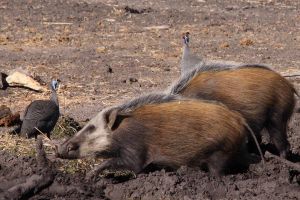
Bush Pig
Scientific Name: Potamochoerus porcus Subspecies: Up to 18 recognised species, here described as one. Distribution: All of Africa south of the Sahara Desert, excepting the desert of Namibia. Habitat: High forest, their fringes and thick bush country, often near rivers. Frequents fields where they cause much damage. Description: A domestic pig-like animal, weighing around 100 kg and measuring...
Read more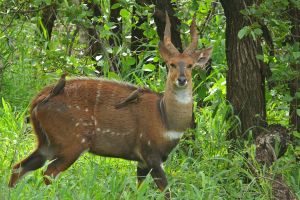
Bushbuck, Cape
Scientific Name: Tragelaphus Scriptus Subspecies: Science dissagree as to how many species there are. We have chosen to include those most relevant to trophy hunters: Tragelaphus s. ornatus, Tragelaphus s. massaicus, Tragelaphus s. sylvaticus. Distribution: Tragelaphus s. scriptus: The West African States Tragelaphus s. ornatus: Zimbabwe, Zambia, Zaire and East Angola Tragelaphus s. massaicus:...
Read more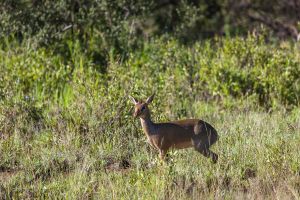
Dik Dik, Günthers
Scientific Name: Madoqua guentheri Subspecies: 4 subspecies are recognised : M. guentheri guentheri (Somalia and Ethiopia), M. guentheri wroughtoni (central Ethiopia), M. guentheri hodsoni (southern Ethiopia) M. guentheri smithi (northern Kenya) Distribution: Northern Somalia, southern Ethiopia, northern and eastern Kenya, parts of southeastern Sudan and Uganda Habitat: Low thicket-type...
Read more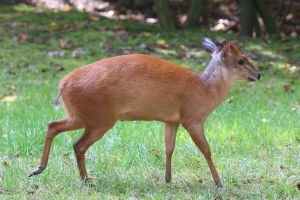
Duiker, Red
Videnskabeligt navn: Cephalophus natalensis Underarter: Ingen. Udbredelse: Udbredelsesområdet for denne art følger et bredt bælte langs den afrikanske østkyst fra Somalia i nord til Natal i Sydafrika i syd. Levested: Foretrækker tætte skovbevoksninger men findes også i visse områder i bush. Beskrivelse: Lille rødbrun antilope med en...
Read more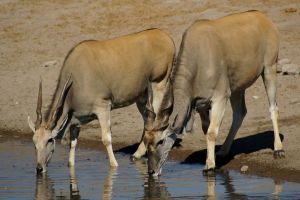
Eland, Cape/Livingstone, Patterson's
Scientific Name: Taurotragus oryx livingstoneiSubspecies: SCI lists Cape Eland as Tragelaphus oryx with three subspecies, which means that SCI counts the Cape Eland with the spiral horned antelopes. We have chosen to list Cape Eland under it's scientific name Taurotragus with two subspecies: Livingstone's Eland (Taurotragus oryz livingstonei) East African Eland (Taurotragus o....
Read more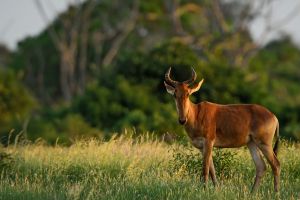
Hartebeest, Jackson’s
Scientific Name: Alcelaphus buselaphus cookie x lelwel (formerly known as A. b. jacksoni) Subspecies: Now thought to be a crossbreed between two subspecies of hartebeest, the Lelwel - and Coke’s hartebeest, although it is regarded by some authors as synonymous to the Lelwel hartebeest Distribution: Uganda and Kenya close to Lake Victoria Habitat: Dry savannah, open plains and wooded...
Read more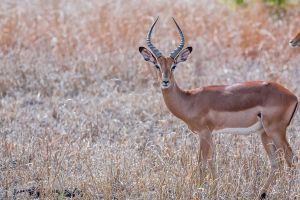
Impala
Scientific Name: Aepyceros melampus Subspecies: East African Impala (Aepyceros m. rendillis) Angola Impala (Aepyceros m. petersi) Distribution: South Africa, Mozambique, Zimbabwe, Botswana, Namibia, Angola, Zambia, Tanzania, Kenya, Uganda and Congo (Zaire) Habitat: Open bush and Acacia savanna Description: The three species are here descriped as on as the difference in appearance is negligent...
Read more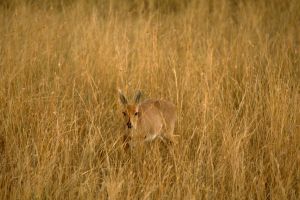
Oribi
Videnskabeligt navn: Ourebia ourebi Underarter: Der anerkendes op til 13 underarter. Den eneste underart, der adskiller sig tydeligt fra de andre er Haggard Oribien Udbredelse: Sydafrika, Mozambique, Zimbabwe, Botswana, Namibia (Caprivi), Angola, Zambia, Tanzania, Kenya, Somalia, Sudan, Chad, C.A.R, Cameroun, samtlige vestafrikanske stater til Senegal. Levested: Åben bush og...
Read more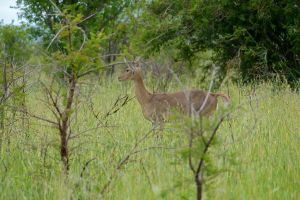
Reedbuck (Common)
Scientific Name: Redunca arundinum Subspecies: None Distribution: Angola, Southern part of Congo, Southern Tanzania, Zambia, Mozambique, Zimbabwe, Botswana, Namibia (Caprivi) and South Africa. Habitat: Open bush and savanna Description: Middlesized antelope with a shoulderheight of up to 100 cm and a weight of 70 - 80 kg. General colour uniform greyish fawn, tinged with brown, with a white...
Read more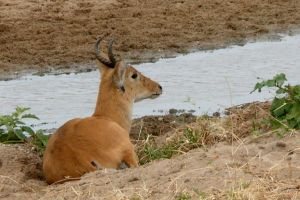
Reedbuck, Bohor/Reedbuck, Bohor
Wissenschaftlicher Name: Redunca redunca Subspecies: Western Bohor Reedbuck (Redunca r. nigeriensis) Eastern Bohor Reedbuck (Redunca r. Wardi) Distribution: Western Bohor Reedbuck: Nigeria, Cameroun,Chad, CAR, Burkina Faso and Benin. Eastern Bohor Reedbuck: Kenya, Tanzania, Uganda and Congo (Zaire) Habitat: Open bush and grassland Description: Middlesized antelope with a shoulderheight of up...
Read more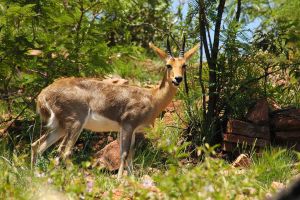
Reedbuck, Mountain
Scientific Name: Redunca fulvorufula Subspecies: We use Asell's classifying which recognizes 3 subspecies: Chanler's Mountain Reedbuck (Redunca f. chanleri) Redunca f. adamauae (this species has not a common name, and very little is known about it.). Distribution: Mountain Reedbuck: South Africa Chanler's Mountain Reedbuck: Tanzania, Kenya and Ethiopia. Redunca f. adamauae: Cameroun and...
Read more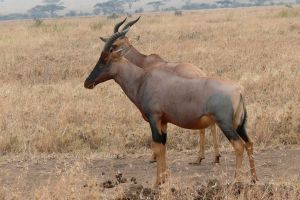
Sassabe
Videnskabeligt navn: Damaliskus lunatus Underarter: Topi (Damaliscus l. jimela) Western Topi, Korrigum (Damaliscus l. purpurescens) Tiang (Damaliscus l. tiang) Udbredelse: Tsesseby: Sydafrika, Mozambique, Zimbabwe, Zambia, Botswana, Namibia, Angola. Topi: Kenya, Tanzania og Uganda. Western Topi: Senegal, Gambia, Burkina Faso, Nigeria, Cameroun, C.A.R, Chad, Sudan. Tiang: Sudan, Ethiopien,...
Read more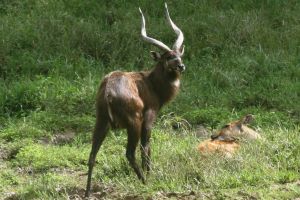
Sitatunga
Scientific Name: Tragelaphus spekei Subspecies: Tragelaphus s gratus, Tragelaphus s. selousi Distribution: Tragelaphus spekei: Kenya, Tanzania and Sudan Tragelaphus s. gratus: Central- and West African rainforests. Tragelaphus s. selousi: Zambia, Namibia, Malawi and South Western Tanzania. Habitat: Confined to swampy areas, mainly papyrus and reedswamps by larger lakes Description:...
Read more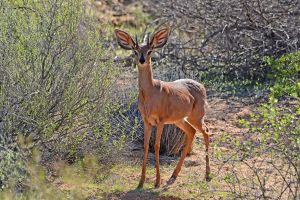
Steenbuck/Steenbok
Scientific Name: Raphicerus campestris Subspecies: Authors dissagree on the number of subspecies, and 1 to 8 subspecies are more or less recognized. Distribution: South Africa, Namibia, Angola, Botswana, Zimbabwe, Zambia, Mozambique, Kenya and Tanzania. Habitat: Open plains with bush and very little woodland. Description: Small antelope weighing 10 - 15 kg with a shoulder height normally not...
Read more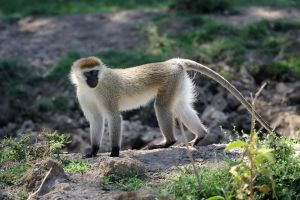
Vervet Monkey
Scientific Name: Chlorocebus pygerythrus Species: There are five recognised subspecies of vervet monkey:Chlorocebus pygerythrus excubitorC. p. hilgerti - found in southern KenyaC. p. nesiotesC. p. pygerythrus found in South Africa, Botswana, Lesotho and SwazilandC. p. rufoviridis found in Uganda and Mozambique Distribution: East Africa for Ethiopia south to South Africa Habitat:...
Read more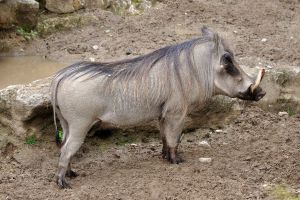
Warthog
Videnskabeligt navn: Phacochoerus aethiopicus Underarter: Der anerkendes op til 7 underarter, der her beskrives under et. Udbredelse: Hele Afrika syd for Sahara med undtagelse af den vestafrikanske regnskov samt ørken områder i Namibia. Levested: Åben bush og græssletter. Beskrivelse: Mindre griselignende dyr der opnår en vægt på 100 kg og en...
Read more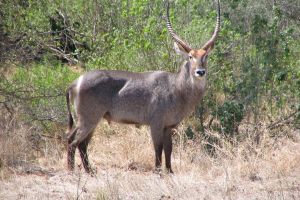
Waterbuck
Videnskabeligt navn: Kobus Defassa Underarter: Common Waterbuck (Kobus d. ellipsiprymnus), Defassa Waterbuck (Kobus d. defassa) Crawshay's Waterbuck (Kobus d. crawshayi). Sing Sing Waterbuck (Kobus d. unctuosus) Udbredelse: Defassa Waterbuck: Kenya, Tanzania, Ethiopien Sudan. Common Waterbuck: Sydafrika, Mozambique, Zimbabwe, Botswana, Zambia, Tanzania, Kenya, Sudan. Crawshay's Waterbuck:...
Read more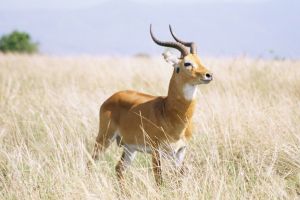
Western, Kob
Scientific Name: Kobus kob Subspecies: White-eared Kob (Kobus k. leucotis) Uganda Kob (Kobus k. thomasi) Distribution: West- and Central Africa. Habitat: Savanna country, flood plains, never far from water. Description: Middlesized antelope of the kop-family. Reaches a weight of 120 kg and a height of 90 - 100 cm. General colour from bright gold fulvous to dark brown with white markings on...
Read moreHunting Area
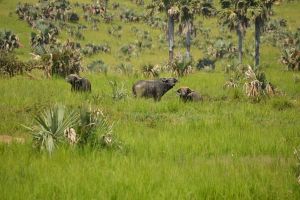
Aswa Lolim Ranches
The former Aswa Lolim Wildlife Reserve was degazetted under Idi Amin. It covers the sub-counties of Purongo, Alero, Anaka and Koch-Goma. Although many commercial farmers have settled in this prime hunting ground, it is still realistic to get Nile Buffalo, Uganda Kob, Hartebeest and Waterbuck. Aswa Lolim lies on the eastern side of the Nile. It covers 500,000 hectares and shares 110 km direct...
Read more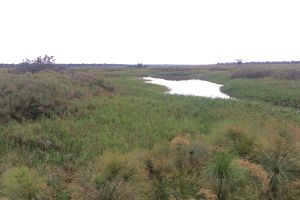
Kafu River Basin
The huge Kafu River Basin stretches along Lake Kyoga, Kafu & Mayanja Rivers and covers the seven districts ofLuwero, Nakaseke, Nakasongola, Kiboga, Kyankwansi, Kiryandongo and Masindi covering about 5,000,000 hectares. The landscape in Kafu consists mainly of Papyrus swamps and dense bush thickets making it a prime hunting ground for the East African Sitatunga, East African Bush Duiker, East...
Read more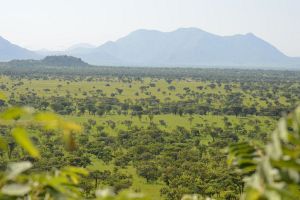
Karamoja
Our Karamoja concessions are stretching over 5 million hectares from Kidepo National Park all the way to Central Karamoja. They include 7 Districts and 2 Wildlife Reserves and are rich in Buffalo, Jackson’s Hartebeest, Oribi, Eastern Bohor Reedbuck, Chanler’s Mountain Reedbuck, Gunther’s Dik Dik and East African Defassa Waterbuck and...
Read more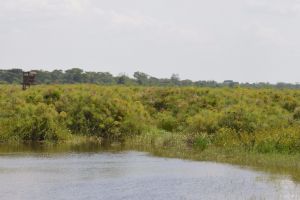
Lake Mburo North
This concession is situated in the South West of Uganda around Lake Mburo National Park. The size of this concession is 150,000 hectares. The landscape is dominated by light rolling grass hills with bush thickets, small valleys with creeks and light forest. Near the river you find dense forests and large stretches of papyrus swamps.The concession is rich with...
Read morePartner
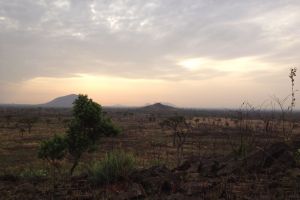
Uganda Wildlife Safaris
Uganda Wildlife Safaris’ slogan is ¨Conservation through sustainable utilisation". Our partners strongly believe in acting ethically in their hunting operation and all the other projects they are involved in. They manage and operate exclusive wildlife areas outside the national Parks in cooperation with the district local governments as well as the Uganda Wildlife Authority and private...
Read more





